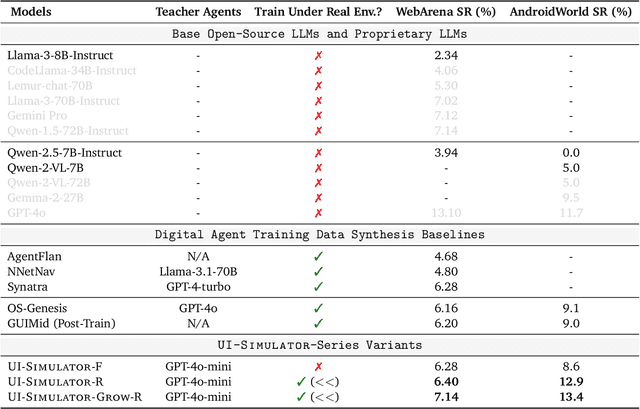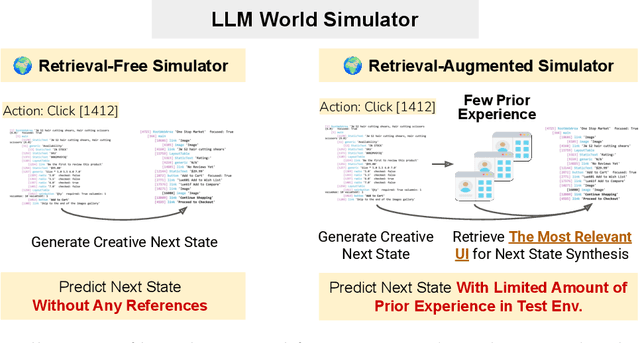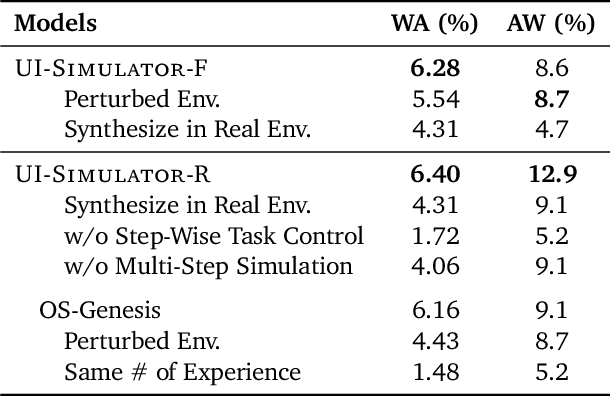Zhiqian Li
LLMs as Scalable, General-Purpose Simulators For Evolving Digital Agent Training
Oct 16, 2025



Abstract:Digital agents require diverse, large-scale UI trajectories to generalize across real-world tasks, yet collecting such data is prohibitively expensive in both human annotation, infra and engineering perspectives. To this end, we introduce $\textbf{UI-Simulator}$, a scalable paradigm that generates structured UI states and transitions to synthesize training trajectories at scale. Our paradigm integrates a digital world simulator for diverse UI states, a guided rollout process for coherent exploration, and a trajectory wrapper that produces high-quality and diverse trajectories for agent training. We further propose $\textbf{UI-Simulator-Grow}$, a targeted scaling strategy that enables more rapid and data-efficient scaling by prioritizing high-impact tasks and synthesizes informative trajectory variants. Experiments on WebArena and AndroidWorld show that UI-Simulator rivals or surpasses open-source agents trained on real UIs with significantly better robustness, despite using weaker teacher models. Moreover, UI-Simulator-Grow matches the performance of Llama-3-70B-Instruct using only Llama-3-8B-Instruct as the base model, highlighting the potential of targeted synthesis scaling paradigm to continuously and efficiently enhance the digital agents.
MMT-Bench: A Comprehensive Multimodal Benchmark for Evaluating Large Vision-Language Models Towards Multitask AGI
Apr 24, 2024



Abstract:Large Vision-Language Models (LVLMs) show significant strides in general-purpose multimodal applications such as visual dialogue and embodied navigation. However, existing multimodal evaluation benchmarks cover a limited number of multimodal tasks testing rudimentary capabilities, falling short in tracking LVLM development. In this study, we present MMT-Bench, a comprehensive benchmark designed to assess LVLMs across massive multimodal tasks requiring expert knowledge and deliberate visual recognition, localization, reasoning, and planning. MMT-Bench comprises $31,325$ meticulously curated multi-choice visual questions from various multimodal scenarios such as vehicle driving and embodied navigation, covering $32$ core meta-tasks and $162$ subtasks in multimodal understanding. Due to its extensive task coverage, MMT-Bench enables the evaluation of LVLMs using a task map, facilitating the discovery of in- and out-of-domain tasks. Evaluation results involving $30$ LVLMs such as the proprietary GPT-4V, GeminiProVision, and open-sourced InternVL-Chat, underscore the significant challenges posed by MMT-Bench. We anticipate that MMT-Bench will inspire the community to develop next-generation multimodal foundation models aimed at achieving general-purpose multimodal intelligence.
OmniQuant: Omnidirectionally Calibrated Quantization for Large Language Models
Aug 25, 2023



Abstract:Large language models (LLMs) have revolutionized natural language processing tasks. However, their practical deployment is hindered by their immense memory and computation requirements. Although recent post-training quantization (PTQ) methods are effective in reducing memory footprint and improving the computational efficiency of LLM, they hand-craft quantization parameters, which leads to low performance and fails to deal with extremely low-bit quantization. To tackle this issue, we introduce an Omnidirectionally calibrated Quantization (OmniQuant) technique for LLMs, which achieves good performance in diverse quantization settings while maintaining the computational efficiency of PTQ by efficiently optimizing various quantization parameters. OmniQuant comprises two innovative components including Learnable Weight Clipping (LWC) and Learnable Equivalent Transformation (LET). LWC modulates the extreme values of weights by optimizing the clipping threshold. Meanwhile, LET tackles activation outliers by shifting the challenge of quantization from activations to weights through a learnable equivalent transformation. Operating within a differentiable framework using block-wise error minimization, OmniQuant can optimize the quantization process efficiently for both weight-only and weight-activation quantization. For instance, the LLaMA-2 model family with the size of 7-70B can be processed with OmniQuant on a single A100-40G GPU within 1-16 hours using 128 samples. Extensive experiments validate OmniQuant's superior performance across diverse quantization configurations such as W4A4, W6A6, W4A16, W3A16, and W2A16. Additionally, OmniQuant demonstrates effectiveness in instruction-tuned models and delivers notable improvements in inference speed and memory reduction on real devices. Codes and models are available at \url{https://github.com/OpenGVLab/OmniQuant}.
 Add to Chrome
Add to Chrome Add to Firefox
Add to Firefox Add to Edge
Add to Edge